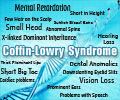Italian scientists report the discovery of a protein that helps in the normal development of the cerebral cortex as well as prevents defects associated with mental retardation.
Italian scientists report the discovery of a protein that helps in the normal development of the cerebral cortex as well as prevents defects associated with mental retardation. Epilepsy, schizophrenia and lissencephaly are some forms of mental retardation. These neuronal disorders occur due to abnormal migration of nerve cells during the development of the brain.
Researchers at the Mouse Biology Unit of the European Molecular Biology Laboratory (EMBL) now say that the protein they have identified, called n-cofilin, may help prevent neural disorders. Published in Genes & Development, a report on their findings suggests that the n-cofilin protein helps organise the cells’ skeleton, and is crucial for preventing neural disorders.The research revealed that mice lacking the protein showed symptoms of lissencephaly brought about by faulty development of the cerebral cortex, the brain’s surface layer. “We genetically engineered mice that lack n-cofilin and they show the same anatomical defects and symptoms as patients suffering from lissencephaly. Their brains miss several cortical layers because neurons do not migrate normally during development,” Walter Witke said, whose team carried out the research.
The researchers say that the ability of neurons to migrate is largely brought about by the dynamic properties of their skeleton. The skeleton of a cell consists of constantly growing and shrinking filaments that function like strings and struts to give the cell shape and stability. According to the researchers, n-cofilin interacts with one kind of filaments, called actin filaments, and helps to disassemble them into their individual building blocks. Interfering with this filament remodelling impairs the cell’s ability to move, and thus blocks migration of neurons during cortical development, they say.
This is the first study to provide the proof that proteins affecting actin filament dynamics are involved in neuronal migration disorders, say the researchers. “This might have implications for humans, too, Like many other cytoskeletal proteins n-cofilin is conserved between mice and humans and it is likely to play a similar role in the development of the human cortex,” Gian Carlo Bellenchi from Witke’s lab said.
This makes the gene encoding n-cofilin an interesting candidate that might be mutated in neuronal disorders such as lissencephaly, and other forms of mental retardation. “The mouse model is a powerful tool to further investigate the roles n-cofilin and the actin cytoskeleton play in stem cell physiology and cell migration. Our studies also identified n-cofilin as a potential target molecule that might allow interfering with stem cell function in diseases where stem cell division has derailed,” concludes Christine Gurniak from Witke’s group.
Advertisement
ANN










